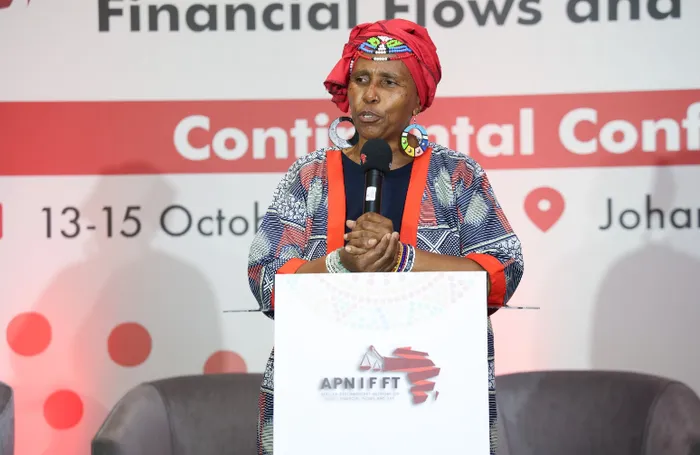
Khanyile Tshabalala, chairperson of the African Parliamentary Network on Illicit Financial Flows and Taxation (APNIFFT). The group has called for greater scrutiny of banking practices as it marks a decade of fighting financial injustice.
Image: Supplied
We need to include banks in the conversation about illicit financial flows, according to Khanyile Tshabalala, chairperson of the African Parliamentary Network on Illicit Financial Flows and Taxation (APNIFFT).
She says the banks were reaping off South Africans. “How am I able to buy a car for R1 million and repay it in five years but can't buy a house of the same amount and repay it over the same period?” she asks, highlighting what she sees as a deliberate imbalance in lending practices.
Tshabalala believes banks are fully aware that long repayment periods increase the risk of default, allowing them to repossess homes and leave consumers homeless.
“For me, we need to look deeper into the illicit financial flows,” she says, urging policymakers to scrutinise the role of financial institutions in perpetuating economic injustice.
She was speaking at the APNIFFT conference, coordinated by Tax Justice Network Africa, which officially opened its 2025 Continental Conference in Johannesburg, South Africa. The gathering marks a decade of collective action to combat illicit financial flows (IFFs) and advance tax justice across the continent.
Parliamentarians, civil society leaders, and development partners from various African nations convened under the theme “A Decade of Combating Illicit Financial Flows and Advancing Tax Justice: Reflection, Innovation, and Political Will.”
The conference serves as a platform to reflect on progress made since the 2015 High-Level Panel Report on Illicit Financial Flows from Africa, led by former South African President Thabo Mbeki, and to set new priorities for the decade ahead.
Tshabalala reflected on the network’s journey and urged delegates to commit to a new era of political will and collaboration.
“We are entering a new decade of opportunity. This conference is not only a reflection of our achievements but also a call to action, to build stronger, fairer, and more resilient economies for future generations,” she says.
Her remarks were echoed by Chenai Mukumba, executive director of Tax Justice Network Africa, who emphasises the broader impact of illicit financial flows. “Illicit financial flows are not just about lost money, they are about lost opportunities for Africa’s development, for our youth, and for the future we envision,” Mukumba says.
Ganief Hendricks, South Africa’s deputy minister of Social Development, also underscored the urgency of the moment in his opening remarks.
“Illicit financial flows are crimes against Africans and against humanity. If we can halt the outflow of Africa’s wealth to the developed world, our economies will thrive, and our governments will be better placed to serve their people. Now is the time to act collectively and reclaim our economic sovereignty,” he says.
PERSONAL FINANCE